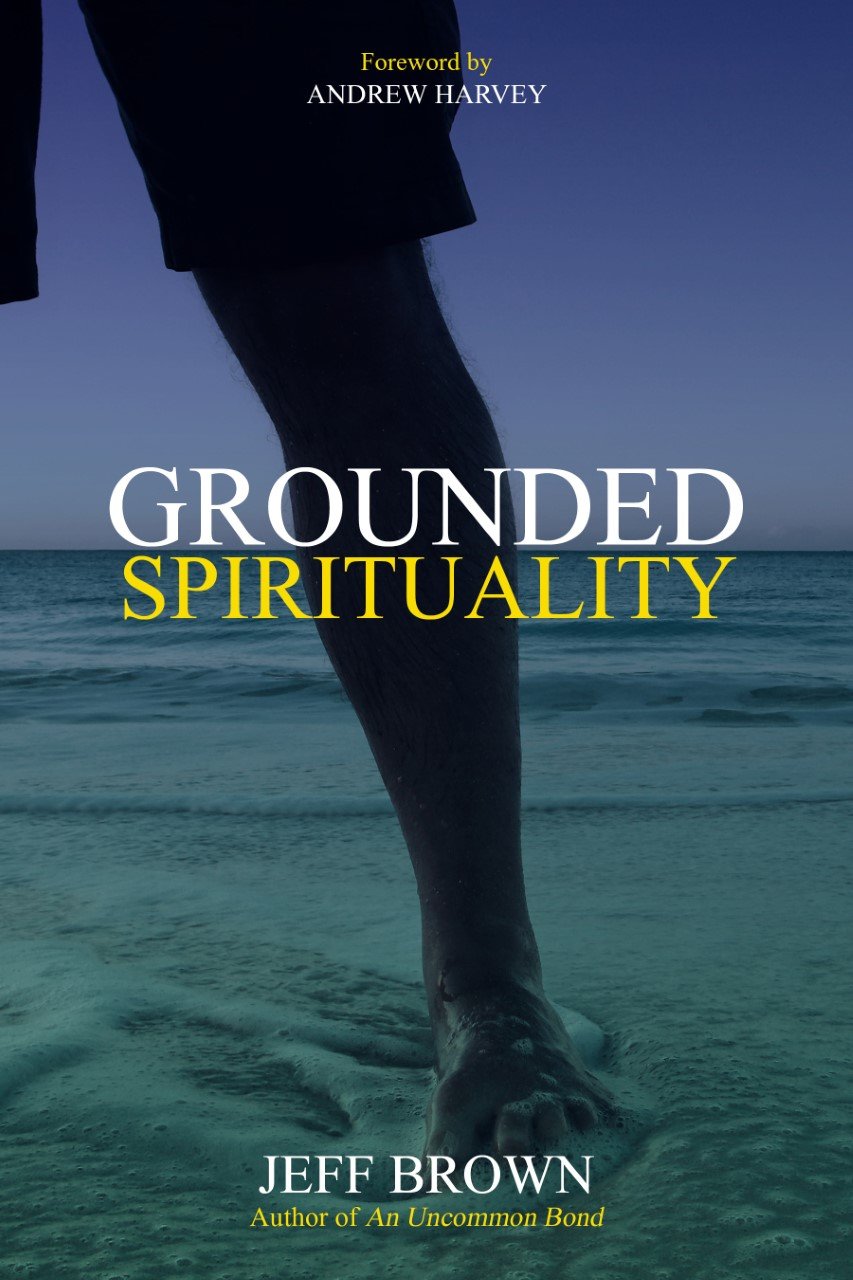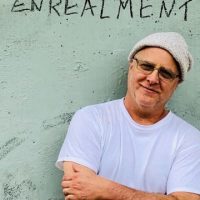
The following is an excerpt from Grounded Spirituality, written by Jeff Brown.
*Editor’s Note: Here at Elephant, we’re notorious bookworms—we love them, and want you to love them, too. But, recently, we found out books are evil—one of the worst things for the environment. Before you buy your next book, read this and this. Keep reading, but read responsibly.
~
Life is the only real spiritual teacher.
The following dialogue is an excerpt from a fictitious stream of conversation between myself, “JB,” and a questioner named Michael, “M,” in my new book, Grounded Spirituality.
JB reflects myself at this stage of my development. “M” is based on a tapestry of various ungrounded spiritual seekers I have encountered, and is also a direct reflection of who I was at prior stages of my journey.
I had considered writing a more objective Q and A, one where the questioner and responder are depersonalized voices with little story revealed. But that form of dry, inhuman interaction felt incongruent with this book’s embodied spiritual message.
If I want my message to be felt on a deeply human level, it feels important to communicate it personally, in the heart of story.
I have taken the liberty of engaging “M” in a deepening dialogue, one that invites us to cover a broad range of material over a series of regular sessions. I have also chosen to enhance the dialogues with various settings, and closing narratives that reflect my perspective on his process. It is my hope that the story comes alive in a way that reflects the message itself.
~
M: I do remember how I would love going to satsangs, and looking up at the guru on the stage. The higher the stage, the more relaxed I became. It calmed me right down. I have to admit, when I look back now, I see my desperation. I was desperate to believe that someone up there was “realized.” And that someday, I would be too. It was the only thing that brought me peace.
JB: It didn’t truly calm you down, Michael—it calmed you “up.” Your “down” was still in a state of disarray. We want to believe there is something up there, watching over us and sharing wisdom. The satguru trip preys on that. It represents the heights of ungrounded spirituality. Grounded Spirituality is not hierarchical. We all meet on the ground level, and learn and evolve together.
M: Guess my guru-trip is long gone. Damn, some of them were really fun to hang with.
JB: It’s a different story when you stop seeing them as “guru,” and start seeing them as an equal, a comrade on the path.
This is why I prefer the term “door-opener.” It’s more accurate. Any being can be a door-opener for our healing and awakening. Everywhere we look, we see relational opportunities for transformation. The key is to not Godjectify any of the door-openers we encounter. They aren’t God—they’re human. We can certainly respect and learn from them, but the moment we begin to project perfection or spiritual mastery onto them, we have undermined our own empowerment.
Nothing will disable you more on the path than perpetually projecting God’s wisdom onto others. Not only because they may disappoint you, but because it’s all too easy to get locked into the safety of a “seeker role” this way.
Finders don’t spend their lives looking for their answers in others. They cherry-pick from a patchwork of different door-openers, and come to realize that they can only find it within. Yes, others know a little something—but when it comes to your own path, only you can know what specific soul-steps to take. Others can provide us with tools that help us to remove the blockages to clear seeing, but they cannot tell us which path to walk.
The real journey is not one of adapting yourself to someone else’s vision, but instead, shaping who you are with your own inner resources. Your karmic clay lives deep inside your soul bones, waiting to be detected, shaped, and molded by your own two hands. You are the only person who can know the true path you are here to walk. You are the sculptor of your own reality—don’t hand your tools to anyone else.
Our reasons for being are privately held; they are encoded within us, embodied, and embedded, a karmic blueprint that can only be read by the one who carries it. That’s why not a single soul on Earth can tell us why we are here. They can’t decipher a language that is original to another soul, no matter what claims they make. It’s one of the most beautiful things about this human trip: the Divine blessed each of us with our own secret lexicon, a unique sacred code that will never be replicated again.
We are the book of our life. Now, all we have to do is hone our inner reading skills.
M: What about the Buddha, Jesus, the saints, the great mystics?
JB: Each offers threads of invaluable wisdom, but each looked at the world through a particular lens, one shaped by their particular context. What one man calls the “Four Noble Truths,” another calls pessimistic nonsense. What one man calls “The Ten Commandments,” another calls simple common sense.
I don’t recommend accepting anyone’s wisdom as definitive truth, unless it resonates with your own deeply lived experience. The moment you blindly accept another’s truth as your own, you no longer have access to the moment, because you are no longer moving from your personally encoded truth. You are no longer here.
Again, the degree to which you can know truth is a direct reflection of how truthful you are about the entirety of your experience. If you have bypassed intrinsic aspects of your self-hood, you cannot see the whole picture, because you are missing integral parts.
I have faith that if we continue to evolve as a species, we will have access to a more inclusive, expansive, and encompassing version of truth than those who came before. Yes, it is helpful to look back in time for insight, but, again, only if it points us in our own direction. I have no reason to believe that the Buddha, Jesus, or Bhagavan Sri Ramana Maharshi have any more access to truth than you or I do. Do you?
M: No, I suppose I don’t. I agree that it would be devaluing to give my power away if it doesn’t reflect my own direct experience.
JB: I also have no reason to believe that those who originate from the East have greater access to wisdom, than those from the West. I mean, what if the Buddha was living in the kind of horrifying society where the only way to survive was to develop non-attachment practices?
Does that mean that his first noble truth—that of suffering—is true for all of humankind, at all times? Or was he speaking from a particular context, one that denied him access to a more positive, or hope-filled perspective?
Because if it’s the latter, then it is quite dangerous to base your life on those convictions. They are circumstantial—not absolute truth. We run the risk of making non-attachment—a healthy tool under trying circumstances—into an entrenched way of being. This denies us access to a more life-affirming and relationally engaging way of being after the darkness has passed.
This is not to diss all of the Buddha’s offerings, it is to elucidate that he spoke from a particular context, and that his perspective and recommended practices are not the answer for every man, woman, and child on this planet. We each have our own noble truths to be discovered.
M: Do you consider yourself a spiritual teacher?
JB: Oh, God, no. Life itself is the only real spiritual teacher—and we all have access to its manifold teachings. Because I define spirituality in the most inclusive sense—as reality—I do not believe anyone is specially qualified to rightfully call themselves a spiritual teacher. Because no single person can teach any one all of reality. Some can effectively explore aspects of reality and provide tools to others, but none of us, at this stage of human development, can access the full grand picture.
All one can access and teach are limited strands. Better to reference yourself by what you specialize in: a meditation teacher, a reiki practitioner, or an embodiment facilitator, rather than a spiritual teacher.
That’s the old delusional paradigm, one that feeds into our sense of smallness and gives the “teacher” an artificial sense of elevated value. And it’s ironic—many of them bash the ego and then seek to strengthen their unhealthy ego by labeling themselves spiritual teachers. Most teachers have not transcended their egos. In fact, their need to be held in high regard as the awakened knower—preserves it.
They call themselves “spiritual teachers,” and yet, many of them are merely larger-than-life trauma survivors.
I know that every time I dare to imagine myself a spiritual teacher, the universe immediately hands me my karmuppance. It’s the great delusion—that some of us can teach reality. Such a soul-limiting imagining.
M: I remember you saying that you have actually found that certain body-centered psychotherapists were the most effective and authentic spiritual teachers you have encountered.
JB: Yes, I said that to make a point. I wouldn’t actually call them spiritual teachers. They can’t teach all of reality, but they can effectively impart some of what we need to align with the intrinsic flow of life. From there, we can discover reality, on our own terms.
If you are looking for a broader experience of reality, I do believe you are far more likely to find it in the somatic psychotherapist’s office, than before a self-proclaimed spiritual teacher. The spiritual teacher—in many cases—will lead you away from the self; while the body-centered therapist—in many cases—will help you to both clear the emotional debris that obstructs your full-bodied presence, and will support the construction of the healthy balanced ego—required before anyone can fully honor their path.
As you have experienced, many gurus will take you further from an embodied experience of reality by inviting you toward a heightened state that lacks individuation and celebrates emptiness.
This may feel peaceful for a time, but it’s not the place to find your life purpose. Because your life purpose is stored in your emotional and physical body. It’s in the bones of your being, at the heart of your story, in the hints and whispers of truth that course through your veins.
You want to find your reasons for being here?
Then you need to come into more of reality—not just a specialized pocket. Don’t look up. Look down. Don’t look to teachers for meaning. Look to life. It will show you the way home.
~
It was the great irony of our dynamic. In order to invite him away from his tendency to Godjectify his teachers, I had to do some teaching. The trick was not to go so far into it that I became his next guru-on-the-stage. That would be entirely counter-productive.
I had to express these ideas in a way that empowered his own willingness to look deep within for his answers. It was a fine line between teaching and reminding. At this stage of our journey together, I felt he was ready to make that distinction. It was almost time for Michael to journey on his own.











Read 0 comments and reply